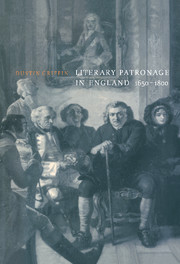Book contents
- Frontmatter
- Contents
- Acknowledgments
- 1 Introduction
- 2 The cultural economics of literary patronage
- 3 The politics of patronage
- 4 John Dryden
- 5 Jonathan Swift
- 6 Alexander Pope
- 7 Edward Young and Richard Savage
- 8 Mary Leapor and Charlotte Lennox
- 9 Samuel Johnson
- 10 The persistence of patronage
- 11 Conclusion
- Bibliography
- Index
6 - Alexander Pope
Published online by Cambridge University Press: 22 August 2009
- Frontmatter
- Contents
- Acknowledgments
- 1 Introduction
- 2 The cultural economics of literary patronage
- 3 The politics of patronage
- 4 John Dryden
- 5 Jonathan Swift
- 6 Alexander Pope
- 7 Edward Young and Richard Savage
- 8 Mary Leapor and Charlotte Lennox
- 9 Samuel Johnson
- 10 The persistence of patronage
- 11 Conclusion
- Bibliography
- Index
Summary
Pope has long been regarded as the first “professional writer” in England able to make a living by his pen, without depending on the support of aristocratic patronage. Ever since Beljame, literary historians have noted with a kind of pride that Pope's Iliad, which made his fortune, was dedicated not to the Earl of Halifax or Dorset, but to a fellow writer, William Congreve. This image of proud independence is one that Pope himself cultivated: “But (thanks to Homer) since I live and thrive,/ Indebted to no Prince or Peer alive … Un-plac'd, unpension'd, no Man's Heir, or Slave.” His sympathetic biographers have largely accepted the claim. Mack goes so far as to suggest that Pope's 1714 contract with Bernard Lintot to provide an English Iliad “foretells the end of the patronage system more effectively than Johnson's famous letter to Chesterfield.” Recent commentators, from Mack to David Foxon, have also made clear how successful Pope was at manipulating the economic levers – floating a hugely profitable subscription, driving hard bargains with his booksellers, setting up a printer and a bookseller to produce his works, and retaining control of his copyrights – that established the financial foundation of his proud independence.
But Pope presents another image to the historian of literary patronage as well. More perhaps than any other writer of his day, Pope lived, as he himself put it, “among the Great” (Imitations of Horace, Satire 11, 1, line 133). Johnson too locates Pope squarely within the patronage system.
- Type
- Chapter
- Information
- Literary Patronage in England, 1650–1800 , pp. 123 - 154Publisher: Cambridge University PressPrint publication year: 1996

